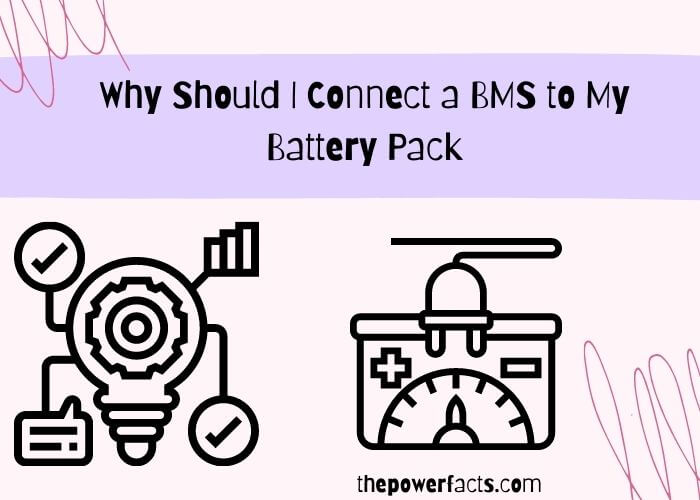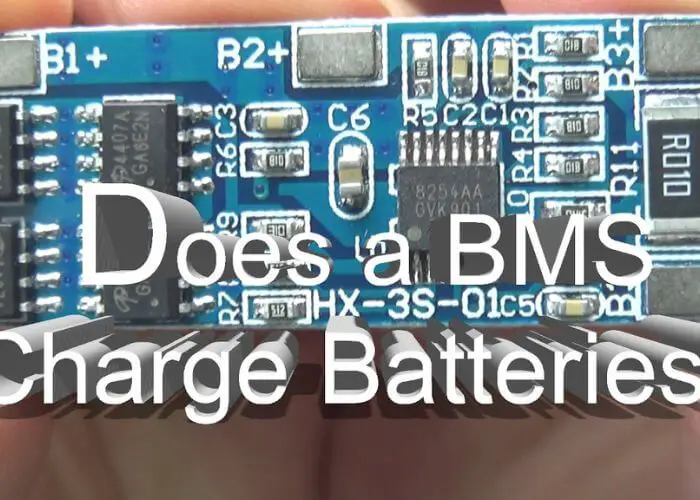If you’re considering connecting a battery management system (BMS) to your battery pack, there are several reasons why this is a good idea.

- First, it can help you maximize the lifespan of your batteries by keeping them within their safe operating range.
- Second, it can improve the performance of your system by providing more accurate information about the state of charge of your batteries.
- Third, it can increase safety by providing protection against overcharging and over-discharging.
Most battery packs these days come with built-in protection, whether a basic overcharge/over-discharge protection circuit or a more sophisticated management system (BMS). But why bother connecting a BMS to your pack if it already has protection? There are two main reasons for doing so: safety and longevity.
By connecting a BMS, you can be sure that your pack will never be overcharged or discharged beyond its safe limits. This protects the cells from damage and ensures that the pack will last many years. Another benefit of using a BMS is that it can provide valuable data about the state of your battery pack.
This information can optimize charging and discharge cycles and help troubleshoot any issues that may arise. So connecting a BMS is always a good idea if you’re looking to get the most out of your battery pack.
How to Connect BMS to Battery Pack?
If you’re looking to connect a BMS to a battery pack, there are a few things you’ll need to keep in mind:
| Number one | First, you’ll need to identify the positive and negative terminals on the BMS. |
| Number two | Then, you’ll need to connect the positive terminal of the BMS to the positive terminal of the battery pack and similarly connect the negative terminal of the BMS to the negative terminal of the battery pack. |
| Number three | Once everything is properly connected, you should ensure that all wires are secure and that there is no chance for them to come loose or disconnect. |
| Number four | Once everything is double-checked and confirmed to be correct, you can then proceed to power on your BMS. |
Disadvantages of Battery Management System?
A battery management system (BMS) is a device that monitors and regulates the charging and discharging of a Li-ion battery pack. It is an important safety feature in Lithium-ion batteries, as it prevents the cell from overcharging or becoming too discharged, which can lead to fires or explosions.
However, there are some disadvantages to using a BMS:
- One is that they can add complexity and cost to a battery pack.
- They also require regular maintenance and calibration, which can be time-consuming and expensive.
- Additionally, if a BMS fails, it can cause the entire battery pack to fail.
How to Select BMS for Battery Pack?
If you are in the market for a battery management system (BMS), there are a few things you should keep in mind to ensure you select the best possible option for your needs.
Here is a quick guide on selecting BMS for the battery pack. First, consider what type of battery pack you have:
Consider the Type
Three common types of batteries are used in BMS – lead acid, lithium-ion, and nickel metal hydride. Each type has its own benefits and drawbacks, so it’s important to choose the right one for your needs.
Consider the Feature
Next, think about what features you need from your BMS. Do you need something simple that just monitors voltage and temperature? Or do you need something more sophisticated to provide real-time data logging and analysis? Select a BMS with the features you need – not more or less.
Consider the Price
Finally, consider the price. Battery management systems can range from fairly inexpensive to quite expensive, depending on their features and capabilities. Finding a balance between cost and quality is important when selecting a BMS for your battery pack.
By keeping these factors in mind, you can be sure to select the best possible BMS for your needs.
What is BMS Wiring?

BMS Wiring is connecting two or more electrical devices together using conductive wire. This can be done in various ways, but the most common method is insulated copper wire. The insulation around the wire helps to protect it from damage and makes it easier to handle.
There are many different types of BMS Wiring available, each with its advantages and disadvantages.
Why is BMS Necessary in Lithium-Ion Battery Pack?
BMS is a critical component in any lithium-ion battery pack. Its main purpose is to protect the cells in the pack from overcharging and over-discharging, which can lead to permanent damage or even failure. The BMS also monitors the cell voltages and temperatures and balances the cells if necessary.
This ensures that all the cells in the pack are working together efficiently and safely. If you’ve ever had a battery leak and gotten that nasty, corrosive acid on your skin or clothes, you know how difficult it is to remove. If you are interested in battery acids, here is more information.
Why is BMS Required for Battery?
BMS, or battery management system, is a device used to protect and monitor lithium-ion batteries. This system ensures the battery’s safe operation by regulating its charging and discharging currents and monitoring its temperature. Without a BMS, lithium-ion batteries can be extremely dangerous.
Overcharging or over-discharging a battery can lead to fires or explosions. A BMS prevents this by disconnecting the battery from the charger once it is fully charged and preventing discharge below a certain voltage threshold. A BMS also monitors the battery’s temperature and will shut it off if it gets too hot or too cold.
This protects both the user and the battery from damage. Overall, a BMS is an essential piece of equipment for any lithium-ion battery setup. It keeps users safe and prevents damage to the batteries and devices they are powering.
Can I Use a Battery Without BMS?
No, you cannot use a battery without a BMS. A battery management system is an essential component in any lithium-ion battery pack. It ensures the safety and longevity of the cells by monitoring their voltages and temperatures and balancing them during charging and discharge.
How is BMS Connected to the Battery Pack?
In a battery management system (BMS), the connection between the BMS and the battery pack is vital to ensure that the BMS can accurately monitor and manage the battery pack. The connection between the BMS and the battery pack can be made through various methods, but most commonly, it is made through direct wiring or a connector. When making a direct connection between the BMS and the battery pack, it is important to ensure that each cell in the battery pack is connected to the BMS.
This allows for accurate monitoring of each cell in the battery pack to identify any issues quickly. If any cells in the battery pack are not connected to the BMS, then those cells will not be monitored by the BMS and could potentially cause problems.
Another common method for connecting a BMS to a battery pack is a connector.
- This offers some advantages over direct wiring, as connecting and disconnecting the BMS from the battery pack can be much easier.
- Additionally, a connector can help prevent accidental shorts when connecting or disconnecting the BMS from the Battery Pack.
- When choosing a connector for this purpose, it is important to choose one that is compatible with the voltage and current of your particular application as well as being able to maintain a good connection even under vibration or other harsh conditions.
End Note
If you’re wondering why you should connect a battery management system (BMS) to your battery pack, the answer is simple: to ensure safety and prolong the life of your batteries. A BMS will monitor the voltage and current of each cell in your battery pack and the temperature. This information is then used to prevent overcharging or discharging, damaging the cells. If you want to know more about different cell batteries and how long they last, read here.
In addition, a BMS can balance the cells in your pack, equalizing their voltages so that they all age at the same rate. This prolongs the life of your entire pack and ensures that it will continue to perform at its best for years to come.
Used References: